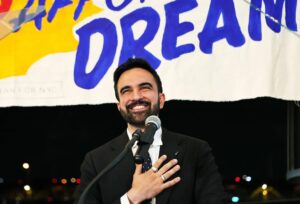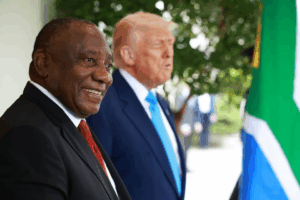
By Fuad Hendricks
The Muslim story of KwaNobuhle township, situated in Uitenhage, neighbouring the Volkswagen manufacturing plant, is the history of the emergence of a nascent Islamic community in the 70’s and early 80’s.
Telling this enchanting story was made possible through the passionate collaboration of Dr Tahir Sitoto, our family friend, a personal friendship many years in the making.
Part of the KwaNobuhle story is also the narrative of my own family, my wife Mimona, children Fatima, Qutb, Towfiq, Sumaya, and cherished mother Mareldia. Also, my distinguished mother-in-law Fatima and her formidable mother Mimona Bardien whose supporting roles were immense.
It is a compelling story of the helpers of the faith, helping hands (Ansarullah) in KwaNobuhle, a township in the Eastern Cape, South Africa, where the denial of fundamental human rights for over three hundred years to the many robbed them of their dignity, freedom, and realisation of their optimum human potential.
KwaNobuhle is not a tale about buildings and material things. But about ordinary people with an extraordinary sense of humanity, most of who would not be mentioned in biographies of famous people but whose simple lives added value to the lives of others, including my own.
It was the courageous but informed decision by persons who have been a part of the established Christian communities to embrace Islam, an unknown religion perceived generally as ‘foreign’ by many in the African townships at the time.
Islam came like a stranger in a community historically and colonially estranged from Islam. The African ancestors’ concept of Allah, God, known as Qamata, defined the Oneness, Uniqueness, and Almightiness of Allah (Qamata) (God). They grasped the Unitarian attribute of God. Madiba, Nelson Mandela, in his book Long Walk to Freedom reflects on the faith of his father:
“…my father remained aloof from Christianity and instead reserved his own faith for the great spirit of the Xhosas, Qamata, the God of his fathers.”
But what transpired and evolved in KwaNobuhle was reminiscent of the early Muslim communities who embraced Islam in Makkah, Madinah and elsewhere where Islam became the faith of choice in the beginning for the few whose majority population perceived it as contrarian to the dominant civilisations of their times.
Prof Debra Mubashir, the African American scholar, shared with me her perspective of life. She said, “One must be the gatekeeper of one’s life. There are those that you must let in to add value and others one must keep out because they may take value away from you.”
I was fortunate that the brothers and sisters in KwaNobuhle and several persons in the traditional Muslim community in Uitenhage and Port Elizabeth entered my life’s journey and enriched me in ways that words cannot adequately tell, and I would have been much less as a person if they did not.
My regular visits to KwaNobuhle started after Themba Nghona embraced Islam. We worked together at Borg Warner in Uitenhage. Our regular daily chats and growing friendship sparked his interests in Islam. He was keen to know which value system informed my lifestyle choices. He was struggling with alcohol addiction and wanted to transform his life.
Tatal once told me, “Fuad, how do I embrace Islam when I am so broken in my personal life.” I told him many of the early Muslims were broken when they first entered Islam, and many throughout the contemporary world are trying to fix their lives seeking Allah’s help to transform and rebuild their lives.
I could still remember that memorable day when Themba asked me to take him to the Imam of the Durban Street Mosque, Sheikh Abubakr Mohamed. I affectionately remember him as Themba Talal Nghona, a middle name he proudly chose, meaning nice and admirable.
I knew Talal Nghona as a very intelligent, astute and erudite person who would have realised his potential to the fullest under another socio-economic-political system, other than South Africa’s colonial and apartheid era.
The most perturbing developments was that the more I visited KwaNobuhle the more the apartheid Security Police became interested in my visits. They made several visits to my house in Rosedale, Uitenhage, questioning me as to what the nature of my visits to KwaNobuhle was all about. They were unconvinced in my answer given that it was purely friendship and brotherhood.
Although every person is important, there were two personalities, Jabir Madaki and Amin Mbaduli whose impressive characters and leadership roles in the KwaNobuhle nascent community made an unforgettable impression on me. Both were caring and altruistic businesspersons. Their empowered mindsets inspired me in several ways. They combatted daily the inhumane restrictions that the apartheid system imposed on them but despite these they stood out as helping hands living in the most oppressive and systemic socio-economic-political conditions.
Aunty Maryam, the wife of Amin Mbaduli, was in the background but her love and support to build an emerging KwaNobuhle Muslim community was admirable and did not go unnoticed.
Another person who embraced Islam during his youth in the 70s, Dr Tahir Sitoto, and who struggled to overcome the oppression of the apartheid system to realise his fullest potential. He together with others played key roles during difficult times when they and others dedicatedly collaborated to nurture the emergence of a Muslim community in KwaNobuhle.
Dr Tahir is a gracious person, and he often expressed his gratefulness to Abdullah and Rahma Sirkhotte for providing him with an enabling spiritual environment to consolidate his formative years in Islam.
Another young man, then, Dr Simphiwe Sesanti, whose militancy and forthrightness to speak justice in the face of the oppressors, was a great inspiration to me. He together with the other KwaNobuhle luminaries taught me and my family that one could overcome an unjust political and economic system to accomplish one’s goals through sheer determination and perseverance. I value his enduring friendship with our family.
Moreover, their lives during hardship informed me and others that discipline and resoluteness could be a bridge between one’s goals and its attainment.
Dr Simphiwe’s sense of brotherhood to always acknowledge his friendship with Ahmed Sayed Moola, his wife Hajira, and others revitalizes my own realisation of camaraderie.
There were also the unpretentious brethren, the back-office supporters like Ghassan Majombozi, Ghulam Zimkhulu Mbotya, Musa Gaba, Hussein Dolo, Zaahir Manziya, and Abu-Bakr Mtoba from Port Elizabeth.
Dr Goolam Hussein of the Islamic Medical Association and the Egyptian cardiologist Dr Ahmed Alqadi, who was based in the United States, visited KwaNobuhle in 1979, a few years after the 1976 Soweto student uprising against the apartheid system. They were impressed with the nascent Muslim community emerging in times of uncertainty in South Africa.
Likewise, the KwaNobuhle community benefited from the visit of the African American activist, Dr Bashir Malik Rashuddeen, later known as Dr Khalid Muhammad. Also, another African American scholar Dr Amina Wadud in her book, Gender Jihad has written fondly about her engagement with the community during her first visit to South Africa in the 90s.
There were several individuals in the traditional Muslim community of Uitenhage who created enabling conditions for us to build bridges of fraternity between the emerging Muslim community of KwaNobuhle and the established Muslim community of Uitenhage.
There was the McCarthy family, Bashir and Farieda and their children as well as the Wicomb family whose friendship empowered us to overcome the separation of communities by the apartheid system through structured racism. The role of Makki Wicomb, Muhammed Ravat, Anwar Tiry, Aunty Hasina, Aunty Lama, Aunty Hajira, Aunty Suleila and many others whose unintended exclusion by name remains in our duas (prayers) for them and their loved ones.
There were many others, too many to mention by name, whose love and support we appreciate during a time when the systemic apartheid racial divide plagued and divided our communities.
Often, I think about Faqir Mohamed, who was visually challenged, traditionally called blind, but who visualised and saw the outside world with his heart and mind. He was elated with the rise of the Muslim community of KwaNobuhle and his steadfast support for worthy causes increased our activism to create an inclusive and human rights-based society and country.
The KwaNobuhle community also appreciates the love and support of Imam (Dr) Rashied Omar, his wife Suleila, and mother Aunty Latifa.
There were others like Imam Omar Noordien whose unfailing brotherhood empowers communities.
The idea as to a person embracing Islam sometimes triggers a debate as to whether one should use the word convert because Allah’s Final Messenger, Prophet Muhammad (peace be on him) taught us that every person is born a Muslim.
But It was Professor Fathi Osman on his visit to South Africa in the 80’s who observed that everyone should, in terms of our individual conscience and consciousness, embrace Islam at some point in our lives even if you have been raised in a Muslim home.
I can remember when I embraced Islam putting my ignorant past behind me. That moment of really embracing the value system of Islam and its moral law was a defining moment in my life. This is no disrespect to my parents but more a maturing moment for me to make life changing decisions.
Like the early Muslims of Madinah, the Muslims of KwaNobuhle emerged as a faith-based community of the few before they built their musjid (mosque). The newly built mosque named Masjid Bilal was completed in 2019.
As Dr Tahir observed, the ‘athaan, call to prayer, success, and remembrance of Allah and following the way of Prophet Muhammad (SAW) and teachings of all other Prophets (peace be on them all) would forever be the welcoming call and message of the KwaNobuhle Muslim community to humankind.


